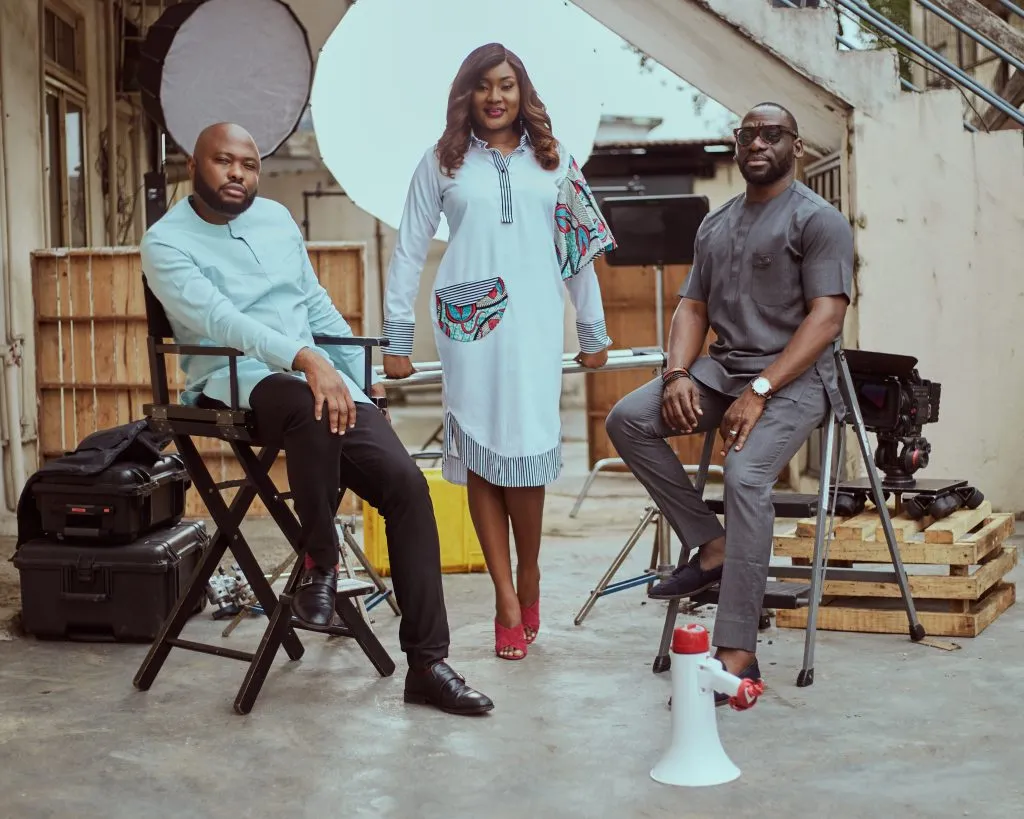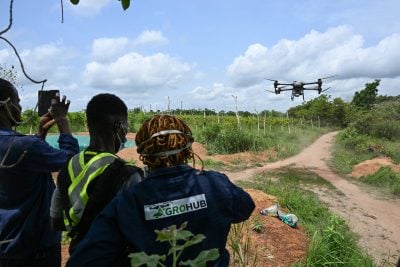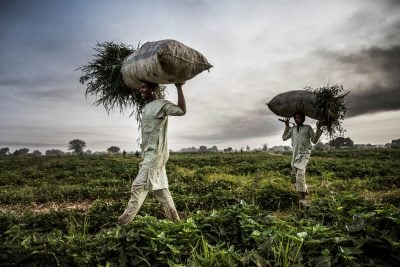In 2010, Lagosian lawyer Zulumoke Oyibo studied the screenwriting book Story by Robert McKee, together with three friends in finance and marketing who shared a passion for writing and cinema. Meeting up frequently to discuss each chapter, the friends soon decided to found Inkblot Productions and try their hands at film-making.
A web series and debut film flopped after they dug into their own pockets while securing funding from family members, a government grant and a smattering of investors, but despite these early setbacks, the Nigerian production house persisted.
Inkblot gained critical success in 2016 when they premiered their films The Arbitration and The Wedding Party at the Toronto International Film Festival, and in December last year, they celebrated their 10-year anniversary during the same week that they announced an exclusive multi-year licensing agreement with Amazon Prime Video.
The deal – Amazon’s first of its kind in Africa – represents the global streaming video on demand (SVOD) giant’s first salvo as they compete with market leader Netflix, and regional players Showmax and myCanal for eyeballs on the continent.
Nigeria’s resurgent cinema culture
“We came in as greenhorns from the corporate world, and we saw the dysfunction of the industry, so we slowly tried to put in some kind of structure, because that’s what will boost the economic value of the space,” says Oyibo, who quit her nine-to-five job in 2015 to focus solely on production.
Cherry-picking some of the industry’s best creative talent and star actors, Inkblot improved the industry’s production quality, aesthetic look and narrative complexities to ride the wave of a resurgent cinema culture in Nigeria.
Driven by a growing middle class in its cities, and investment from global cinema giants like IMAX, Nigeria now hosts 77 cinemas, up from just 45 in 2019 – serving a population of approximately 210m – according to Statista, a market research firm.
The Wedding Party, a romantic comedy about an insecure bride and her reformed playboy groom following an accidental proposal, broke box office records on its theatrical release, grossing N453m ($1.2m) at cinemas in Lagos, Abuja, and at other screens around the country.
The gangster comedy film Omo Ghetto: The Saga smashed records in 2020 for SceneOne Productions, despite restricted cinema numbers because of Covid protocols, grossing $1.6m at the box office.
Inkblot’s new partnership with Amazon will see the studio’s future movies made exclusively available to Prime Video’s roughly 200m worldwide subscribers, after their theatrical release on Nigerian screens.
Showcasing Nollywood
“We want to showcase the best of Nollywood and Nollywood stories that are multifaceted and have depth and breadth; stories which tell multidimensional and not one-dimensional stories about Nigeria,” says Ayanna Lonian, Amazon Prime Video’s head of worldwide major studio licensing strategy.
The Nigerian film industry – widely known as Nollywood – produces content for different ethnic, regional and religious audiences throughout the country. Meanwhile Kannywood – the Hausa-language industry based in Kano – is ramping up production in Nigeria’s north.
Nollywood currently has an annual growth rate of 8.6% according to PricewaterhouseCoopers. With over 2,500 films produced annually, it is the second largest film producer in the world, and employs about a million people directly or indirectly, making it Nigeria’s second largest employer. In 2021, Nollywood generated $687m for the economy, a 2.3% contribution to Nigeria’s GDP.
Nigerian cinema has the potential to become one of the country’s greatest exports as increased broadband penetration and cheaper internet data drive the demand for African-made content at home and abroad.
An arthouse scene is also bubbling up, typified by the film For Maria Ebun Pataki that tackles the subject of postpartum depression, while Nigerian feature-length animated films are widening the stylistic offerings coming out of Africa’s most populous nation.
Scope to expand
“Inkblot and Anthill studios (who Prime Video also recently partnered with) are not scared of taking risks and both studios want to expand the range of Nollywood stories and genres that they explore,” says Lonian.
“If Nollywood filmmakers focus on telling compelling, authentic, hyper-local and universally accessible stories – that are grounded in the rich history, lived experiences and culture of Nigeria – I believe that those stories will travel and will engage audiences around the world.”
The size of the deal struck between Inkblot and Prime Video is undisclosed, but Zulumoke Oyibo says Inkblot will now have greater funds to employ additional world-class creative writers, producers, and marketers, who can attract further investors into the space.
A low budget Nollywood film costs on average between $35,000 and $100,000 to make, according to the BBC. But budgets and funded models are becoming more expansive. The Wedding Party 2 was financed by the Elfike Film Collective, a joint venture between four leading players in the sector, including Inkblot.
New opportunities for talent
With increasing genre diversity, cinema returns and new revenue sources for blockbuster Nollywood productions, opportunities for writers, producers and directors will likely multiply, as the industry looks set to begin a new rapid growth phase.
On average, a Nollywood script costs just $600 to license in Nigeria, and with similar low-paid fees for writers across the continent, prioritising screenwriting is essential to improving content and attracting top talent.
Realness Institute, a pan-African cinema organisation, has partnered with Netflix to train screenwriters and film professionals from Nigeria, South Africa, and Kenya, as part of their paid 2022 Episodic Lab and Development Executive Traineeship (DET) programmes.
Mehret Mandefro, Realness Institute’s director of development and partnerships, says Netflix has its eye on the huge database of film and TV professionals Realness Institute has collated, and successful applicants to their programmes will have the chance to pitch their ideas directly to Netflix, which has a global $15bn original production and licensing budget.
“What was so attractive about partnering with Netflix, is that there is a chance for projects to get commissioned. So we are creating an opportunity for a writer to have a route to employment to a giant streamer like Netflix, where African writers can get paid, doing what they do at the highest level,” says Mandefro.
With piracy gutting margins from DVD sales and rendering them unprofitable, Inkblot and other major African film studios now have two major revenue streams, with theatrical releases preceding showings on SVOD platforms.
Netflix and the BBC have set up development partnerships with Nigeria’s EbonyLife for a slate of original dramas for their online platforms. Disney joined forces with Nigeria’s FilmOne Entertainment, and LA based Emagine Content signed with Nigeria’s Vortex Corp to adapt its catalogue of African superhero and fantasy titles for TV and film.
The growth of streaming
With Africa becoming a battleground for streaming subscriber growth, revenues are expected to exceed $1bn in sub-Saharan Africa by 2024, a massive jump from $223m in 2018, according to Digital TV Research, a London-based consultancy firm.
Digital TV Research forecasts that there will be 13.7m SVOD subscriptions in Africa by 2027, up from 4.9m at end-2021. South Africa will contribute 4.4m of the 2027 total, with Nigeria bringing in a further 3.4m, says Simon Murray, Digital TV Research’s principal analyst and owner.
Netflix is projected to enjoy the most success. Its subscriber base “will grow from 2.7m at end-2021 to 6.4m in 2027,” while Amazon Prime Video are forecast to have 2.2m African subscribers in five years. Netflix’s Nigeria subscription costs range from around $3 to $11, while Amazon Prime Video has a single tier price at $6 per month.
“Apart from regional players such as Showmax and myCanal, there are few local success stories. Local players do not have the resources to compete against the global players, but they do have the advantage of producing local content. Success for them may rely on them supplying the global players rather than going it alone with their own platforms,” says Murray.
Incentivising the African film industry
In a recent report about cinema in Africa, Unesco said Africa’s film sector could create over 20m jobs and contribute $20bn to the continent’s combined GDP, if better funded.
Just 19 African countries offer financial support to film-makers, and for Mandefro, the continent’s untapped and underfunded film sector presents a chance for governments to showcase Africa and allow Africans to tell their stories to the world.
“We did a study in Ethiopia and it just blew my mind how hard it was for some of the practitioners to import the equipment they needed and the luxury taxes that were applied. We need to remove all those kinds of barriers so that it can really grow and generate revenue for the country,” says Mandefro.
African film industry professionals have taken heart at the resilience of their industry during Covid, and from more Africans consuming their own stories at the same time as international financing deepens.
“This will incentivise people and we’ll see democratic benefits, as creating space and increased expression has dividends for all of civil society,” says Mandefro.
Want to continue reading? Subscribe today.
You've read all your free articles for this month! Subscribe now to enjoy full access to our content.
Digital Monthly
£8.00 / month
Receive full unlimited access to our articles, opinions, podcasts and more.
Digital Yearly
£70.00 / year
Our best value offer - save £26 and gain access to all of our digital content for an entire year!

 Sign in with Google
Sign in with Google 





